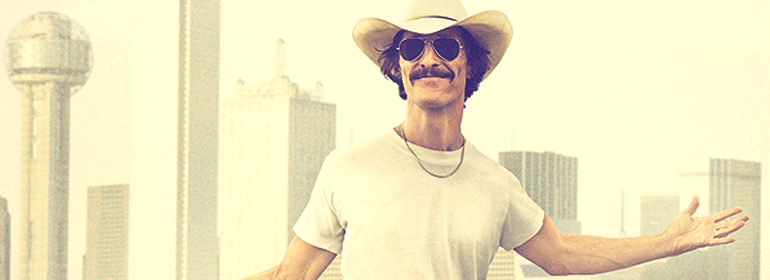Dallas Buyers Club might not be the classic about the Aids epidemic Hollywood has yet to make, but it’s one hell of a good film, says Simon Mernagh.
Twenty years on from Philadelphia and we’re still no closer to a stone-cold Hollywood classic about the HIV/AIDS epidemic. As it stands, high-profile movies where gay people save their own lives during the crisis are limited to documentaries. Though Dallas Buyers Club boasts thrilling achievements in acting, it will be remembered as an interesting footnote to a cinematically underexplored segment of human history rather than a landmark testimony on the topic.
It’s 1985, and Ron Woodroof (Matthew McConaughey), an aggressively hateful, woefully thin, Texan electrician, catches HIV from unprotected sex at the rodeo. Dissatisfied with his doctor’s (Jennifer Garner) prescriptions, he founds a ‘buyers club’ with fellow sufferer Rayon (Jared Leto), his transgender hospital-bed neighbour, to distribute unapproved medication imported from Mexico, earning money and saving lives in the process.
Queer critics have, understandably, slammed director Jean-Marc Vallée’s decision to revolve his follow-up to 2011’s Café de Flore around a heterosexual Southern homophobe. Is he pandering to conservative Academy voters, or simply neglecting the gay community by playing it ‘straight’?
Actually, he’s doing neither. An extremely prejudiced redneck named Ron Woodroof once walked the earth, and his fascinating story demands attention; a lesser amount, sure, than the true heroes of the HIV/AIDS outbreak, but there’s a villain of a different nature at the heart of this film other than the homophobic elements that were hell-bent on stigmatising the virus.
McConaughey’s upward career trajectory of late has been noted by critics worldwide, but with Dallas Buyers Club Hollywood’s fastest-rising star reaches stratospheric heights. Despicable and dastardly to the extreme, the actor’s penchant for playing slimy Southerners is fully realised here, with his Texas drawl proving a believable mouthpiece for Woodroof’s deep hatred of difference. Few others could play straw-chewing, rodeo-riding homophobic bumpkins quite like him.
Crucially, Dallas Buyers Club doesn’t deify Woodroof; without giving anything away, Ron oscillates only between various points in the ‘asshole’ spectrum throughout the movie. Taking advantage of his condition for his own selfish sake, any benevolence on Ron’s part is purely coincidental. This isn’t a straight white guy saving the day; rather, he’s seizing it for personal gain. As hetero-centric as the movie’s approach to the Aids crisis may be, Ron’s singular nastiness nullifies all traces of glorification.
 Leto likewise delivers a career-defining performance devoid of all parody or mockery. Tragic and tender in equal measure, Rayon’s woes as a transgender person struggling with Aids are treated with dignity, and her intricate character proves suitable foil for Ron’s one-note hostility.
Leto likewise delivers a career-defining performance devoid of all parody or mockery. Tragic and tender in equal measure, Rayon’s woes as a transgender person struggling with Aids are treated with dignity, and her intricate character proves suitable foil for Ron’s one-note hostility.
Although Dallas Buyers Club conforms to storybook-conventional dramatics in the final act, the movie rightly aims its crosshair at the American Food and Drug Association throughout, for promoting untested, immune system-annihilating medicine over unregulated but successful foreign equivalents. A far worthier villain than the usual banner-waving religious fundies or knuckleheaded anti-gay thugs, the FDA’s staggering incompetence is finally immortalised here.
While we’re still waiting for that Hollywood movie, Dallas Buyers Club remains a confident step in the right direction, buttressed by sterling performances and an involving true-life tale.
Dallas Buyers Club opens nationwide this Friday, February 7.
© 2014 GCN (Gay Community News). All rights reserved.
